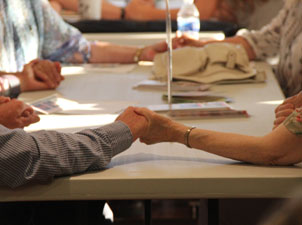
Something Which Can Never Be Taken Away
By James Luisi
From NETWORK’s Catholic Social Justice Reflection Guide
Last spring I went to jail for the first time. Not because I had been charged with any crime or because I had been arrested—I was with a group of students from Boston College’s School of Theology and Ministry. We were in jail together that Sunday morning, seeking to pray and break bread with the inmates.
I suppose the jail matched what I could imagine based off a season of Orange is the New Black. The walls were painted cinder block. The doors locked behind us wherever we went. Corrections officers were stationed periodically throughout the hallways, buzzing us through.
I wasn’t even sure why I was there that morning or what I was expected to do. As part of a school-wide week-of-service, some of us had the opportunity to go to the jail to do “prison ministry” but I had no clue what that actually meant. Was I expected to talk to the prisoners? Counsel them? Tell them about God?
I breathed a sigh of relief when I learned I wouldn’t be going alone through the jail that day. Our task would be rather straightforward and simple: my fellow student and I would go with the seasoned chaplain to three locations in the prison; we would celebrate a communion service with a pre-written reflection from the chaplain and offer the prisoners a chance to say a word or two about the readings if they felt so called; and then we would pack up and go to the next location. I took comfort in the simple formula that our day would follow, knowing there was not much I could mess up so long as I didn’t miss getting buzzed through a door.
I don’t really know anything about the men I met in the jail that morning. I quickly learned that I was not being asked to “do” anything for them. There was nothing to do. The simple act of being present, of acknowledging the fundamental human dignity of the men in jail that day by praying with them, by sharing the Eucharist with them—that was all I could do.
Society often values human life only by what it can contribute to its prosperity. Most people might even agree with the reasonable-sounding idea that, for the most part, society should be structured to give to each person that which they have earned. It’s hard to argue with the logic of a meritocracy—if you work hard, you should be able to get ahead in life; if you pursue higher education, you should make more money doing less strenuous work; if you have an innovative idea, you should profit from your ingenuity.
People in jail are severely limited in their ability to contribute to society. In fact, they have been removed from society precisely so that society can extract a debt from them. It is not for me to say whether or not the men I met that day merited their sentences; in fact, many if not all of them may have been duly processed for a law they had broken.
But this is precisely the point. Human dignity is not only something which cannot be earned, it is also something which can never be taken away, even if one has committed a heinous offense. What I learned by praying with those in jail is that human dignity radically transcends both merit and demerit—nothing can add to nor detract from the humanity of any human being, in any circumstance, ever. A person couldn’t even renounce his or her own human dignity, so intrinsically is it linked to their very being!
We should be able to agree that those things which are necessary to uphold the human dignity of our fellow sisters and brothers—things like nutrition, shelter, healthcare, community, the opportunity to participate in society—are things for which no one must prove merit. Then, perhaps, we can begin to have a reasonable debate about how we can go about providing these things to all people. This might sound pretty radical, but then again, that’s human dignity.
James Luisi is a third year student at the Boston College School of Theology and Ministry, and a former NETWORK Government Relations Associate.







